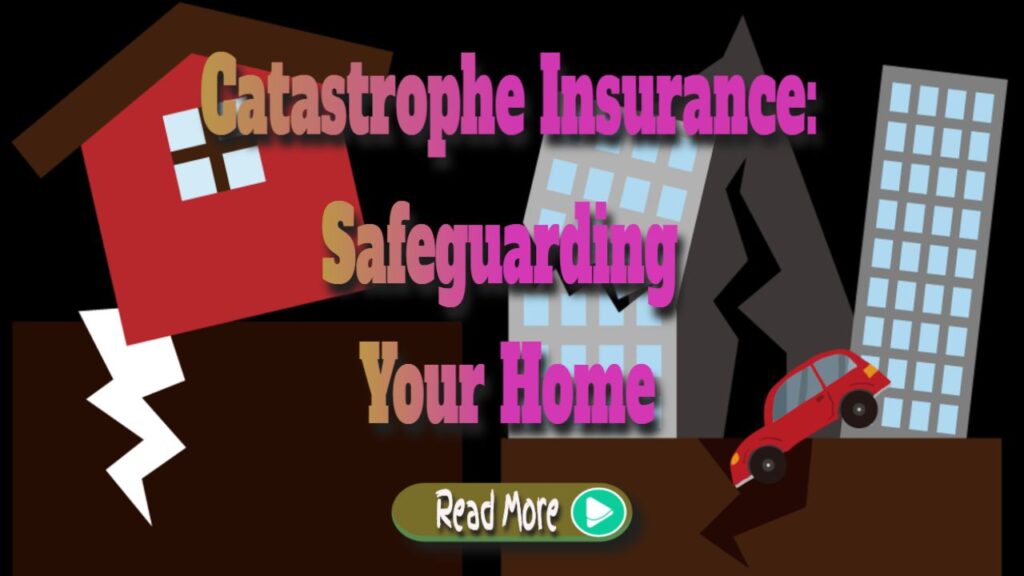Catastrophe Insurance: Safeguarding Your Home
Catastrophe Insurance: Safeguarding Your Home: If you’ve ever seen a disaster movie, you know how devastating natural calamities like volcanic eruptions and earthquakes can be.
But doesn’t the movie industry exaggerate these disasters? While Hollywood certainly goes to extremes, it may surprise you to learn that natural disasters cost the United States an average of $80.7 billion each year (via NOAA).
Disasters, ranging from rising floodwaters to earthquake-related foundation-shaking, are devastating situations that must be planned for by every home (especially those who live in higher-risk areas).
Even if your homeowner’s insurance covers a variety of situations, it may not cover all known disasters. To reduce the cost of repairs, special disaster insurance coverage is required.
Catastrophic insurance is supplemental insurance that protects you (and your home) from natural disasters such as floods, hurricanes, earthquakes, tornadoes, volcanoes, and sinkholes.
Some homeowners, on the other hand, get extra fire insurance to further protect their houses and belongings.
Individual supplemental insurance policies for various calamities are available, and some are even required by law, depending on your area.
What exactly is catastrophe insurance?
Catastrophic insurance is supplemental insurance that protects you and your home from natural disasters such as floods, hurricanes, earthquakes, tornadoes, volcanoes, and sinkholes. It also guards against man-made disasters such as civil unrest, terrorist attacks, and explosives. Many of these disasters are not covered by ordinary house insurance plans and must be protected by a specific policy add-on.
What is the definition of private disaster insurance?
Private catastrophe insurance (also known as private umbrella insurance) is unrelated to specific disasters, but it does provide additional liability protection for a variety of occurrences.
It is a supplement to your home or auto insurance that protects you and your family from medical expenses if you or your family injure someone.
What is the catastrophe insurance process?
Many natural catastrophes are not covered by standard homeowners’ insurance plans, so you may need to get supplemental insurance to get the protection you need.
Catastrophic insurance is a catch-all term for a variety of additional insurance plans that supplement your homeowner’s policy, such as the sorts of storms covered and the amounts of coverage for all covered catastrophes (i.e., you’ll be better protected and spend less money upfront). Individual supplemental insurance for a number of disasters is provided, including:
Earthquake
Floods
Hurricanes
Landslides
Mudslides
Riots
Landslides
Terrorism
Tsunamis
Vandalism
In the woods, there are fires.
Of course, some of the aforementioned scenarios occur significantly more frequently than others.
Assume you live in an area where the risk is high. To properly prepare for a natural disaster, your state government may even require you to obtain a separate catastrophic insurance policy. Coastal locations, tornado zones, and earthquake belts are common areas where additional insurance coverage is required.
How can I keep my house safe from natural disasters?
Aside from full coverage insurance, there are a few additional things you can take to safeguard your property against major storms. The following measures, ranging from home upkeep to fixing broken roof tiles, are recommended for all residences to limit the damage that may occur during even a little storm.
Bring any yard equipment or outside furniture that might be blown inside by a strong wind.
Examine weatherstripping for cracks or leaks and repair as needed to keep water out.
Rain gutters should be cleaned at least once a year to ensure that rainwater drains properly.
To avoid wear and tear, maintain your home on a regular basis.
To reduce flood damage, raise appliances a few inches above the ground.
Replace any damaged or loose roof shingles to better safeguard your property from storms.
Secure all outdoor structures, such as carports, porches, and sheds, to the ground or foundation.
To avoid overhanging branches falling on your house during a storm, prune them once a year.
As needed, replace your garage doors with newer models that can withstand high winds.
Keep these tasks on your to-do list all year, not just during hurricane and tornado season. Because home insurance plans frequently reward proactive mitigation efforts, upgrading your home to better protect it is a good idea. Protecting yourself from storms can save you a lot of money in the long term.
While you shouldn’t expect a Hollywood-style tsunami to reach your neighborhood anytime soon, an insurance consultant may provide you with information on disaster protection for your property. If you want to delve deeper, visit our learning center for the most up-to-date house insurance information and advice.
The post Catastrophe Insurance: Safeguarding Your Home appeared first on https://gqcentral.co.uk

